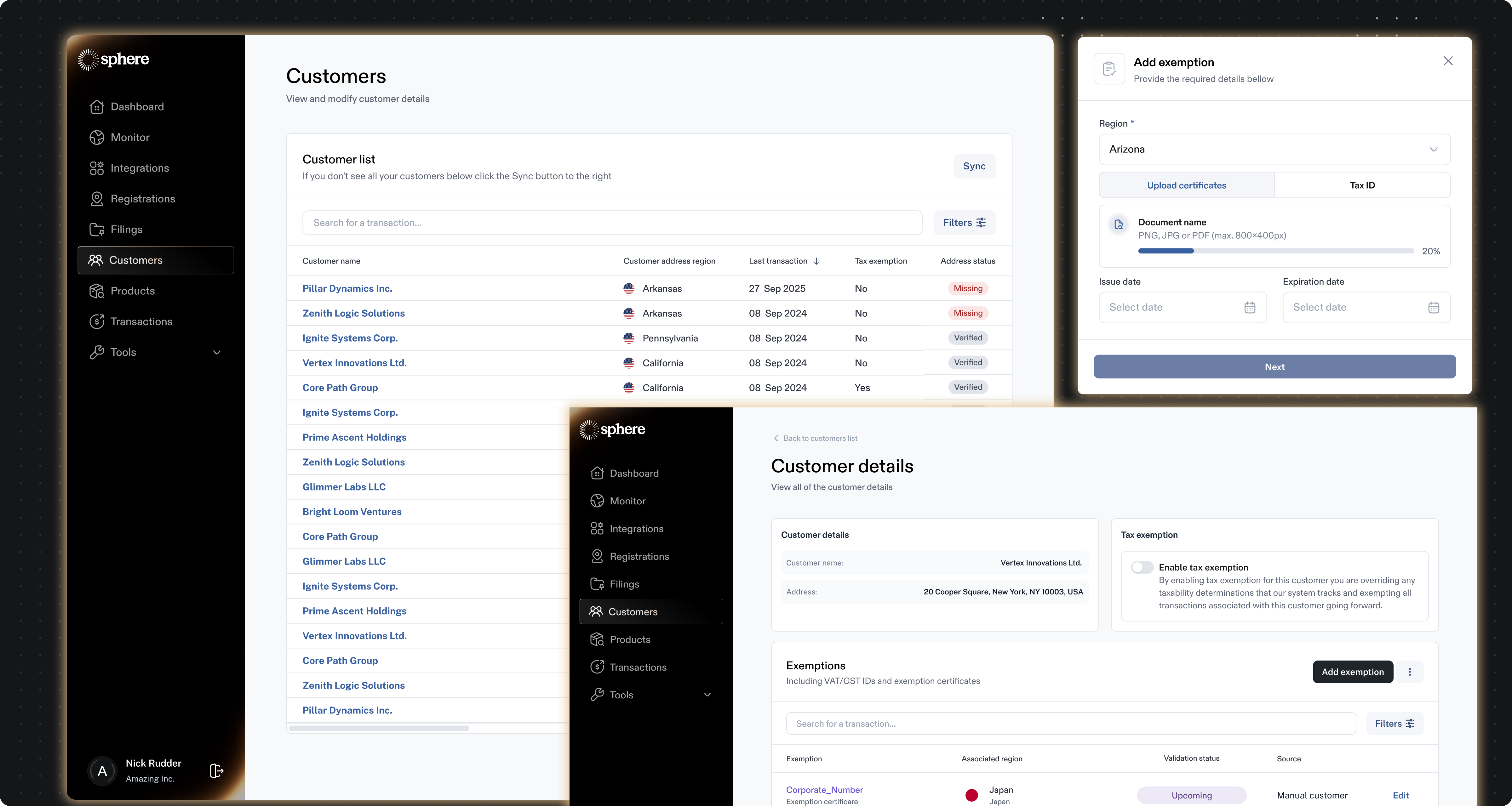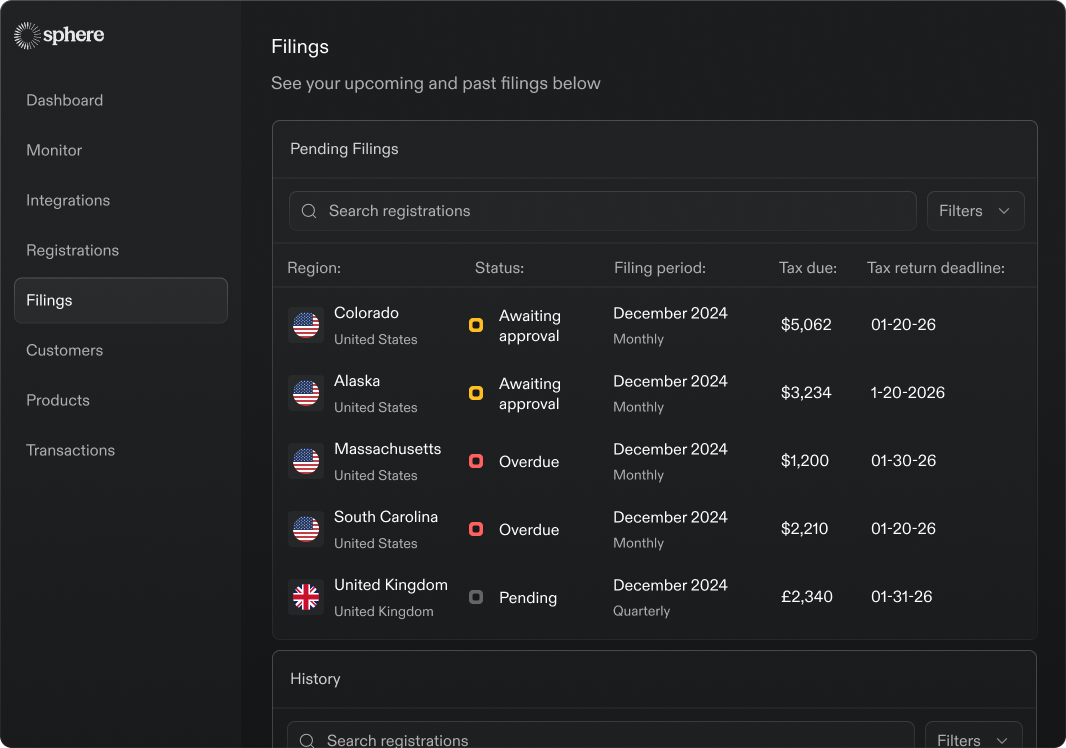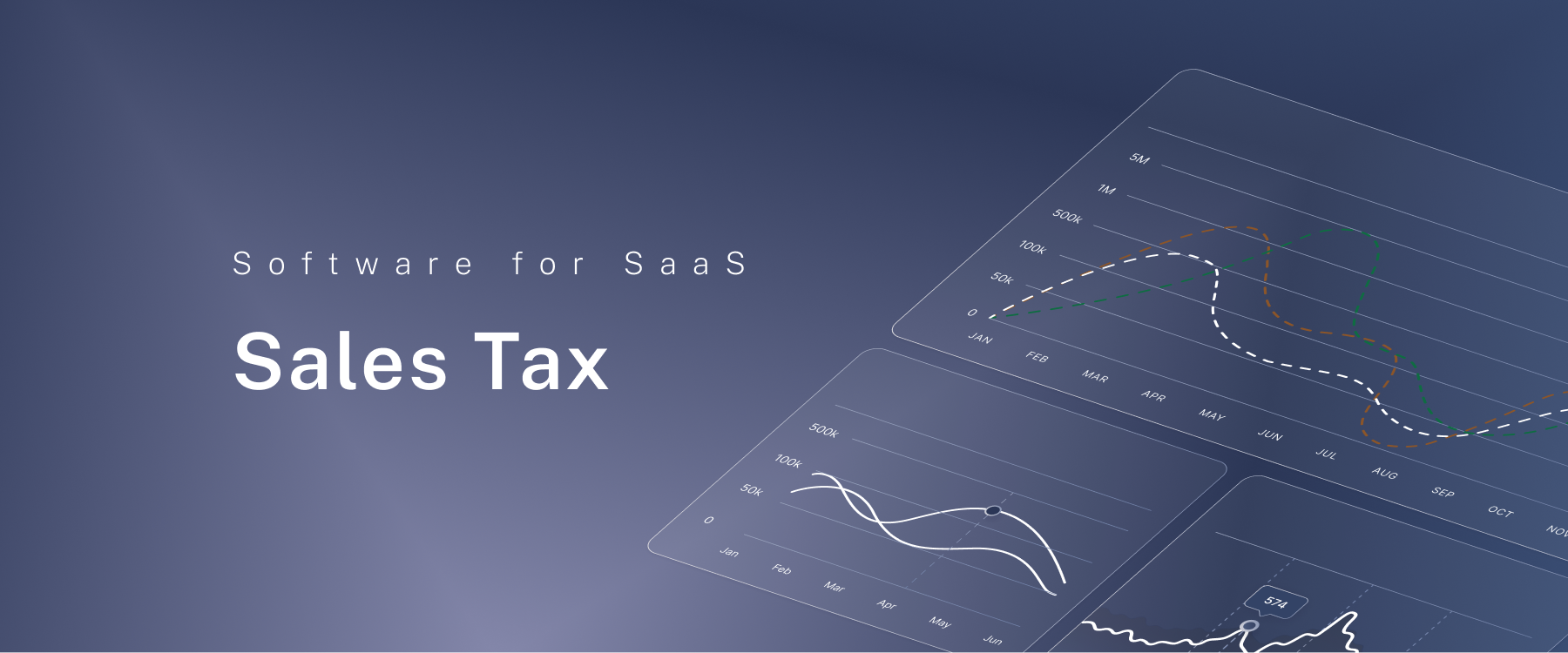
Tax exemption certificates aren’t just for retailers—they matter for SaaS and AI companies selling to nonprofits, resellers, and government buyers. Failing to collect or manage them properly can result in audits, back taxes, and other tricky compliance risks.
Small finance teams can soon become overwhelmed with managing each U.S. state’s unique rules and laws when it comes to tax exemption. In the case of tax exemption certificate management, knowledge–and automation–are the keys to compliance.
What Is a Tax Exempt Certificate?
Tax exempt certificates defined
“Tax exempt” certificate is a blanket term for a document or permit that allows for buying taxable tangible personal property or taxable digital goods without paying sales tax. Tax exemption certificates are a United States indirect taxation phenomenon.
Who can use a tax exempt certificate?
Only certain entities are allowed to use a tax exempt certificate.
- Resellers – companies making purchases that they plan to resale. I.e. a store purchasing inventory from a distributor.
- Government entities - Many government entities do not have to pay sales tax when making purchases.
- Schools – Schools are often exempt from paying sales tax on purchases of items that will be used for educational purposes. Even private schools can be considered exempt organizations.
- Nonprofits – Depending on nonprofit status and how items will be used, certain nonprofits don’t have to pay sales tax on purchases.
How do tax exempt certificates work?
Resellers, governments or nonprofits who wish to make a purchase without paying sales tax must present their tax exempt certificate to the sellers. The seller then verifies the validity of the certificate and no sales tax is charged.
The seller is liable for verifying the validity of tax exempt status. They must retain copies of tax exempt certificates for all non-sales tax transactions.
What are the benefits?
Though they present an administrative hassle, using a tax exempt certificate allows entities to purchase items without the expense of paying sales tax.
Why Tax-Exempt Certificates Matter for SaaS Companies
In some cases, SaaS companies may need to deal with tax exempt certificates. For example, when selling to schools, government entities or nonprofits, you may need to verify the buyer’s status in order to legally not charge sales tax. SaaS companies may also, in some cases, sell their product to resellers who white label their product.
No matter why a customer requests tax exempt status, it’s vital to do the following:
- Validate the resale certificate
- Keep copies of proof that a sales was tax exempt
Compliance Risk
Tax compliance is the duty of the seller. If a company fails to charge sales tax in instances where they should have, they almost always bear the liability and must pay the uncollected taxes out of pocket.
Types of Tax Exemption Certificates
As a company, you’ll likely deal with different types of exemption certificates. The two most common are resale certificates and entity-based certificates.
Resale certificates
Tax exempt certificates based on the fact that your customer is buying products to resell.
Entity-based certificates
Tax exempt certificates based on an entity’s status, such as a government department, religious or educational institution, or nonprofit organizations.
Usage-based exemptions
Tax exempt certificates based on how a product will be used. I.e. if the purchase will be used for manufacturing, or research & development (R&D).
Direct pay certificates
Some very large companies pay use tax directly to the government rather than to vendors. In this case, they provide the proof of a direct pay agreement to their vendors.
How to Obtain a Sales Tax Exemption Certificate
Obtaining a tax exempt certificate depends on your entity type and usage.
Resellers simply need to be registered to collect sales tax. A company’s sales tax registration number generally also serves as their tax exemption number (for resale transactions). Though note that some states will only allow resale businesses that are registered for sales tax in that particular state to buy items tax free.
Government entities, schools, and other nonprofits must apply for tax exempt status from the IRS and, in most cases, the state. Necessary forms depend on your entity’s status. The IRS provides guidance for individual entity types here.
Managing Certificates as a Seller
Because sellers are on the hook to pay uncollected taxes, even in cases of accidental tax exemption or fraud, it’s important to carefully handle every tax exemption request.
Validation and Red Flags
Tax exemption certificates should be carefully examined.
- Validate tax registration number – For resellers, this is generally their sales tax registration number. For government entities, this may be their taxpayer identification number (TIN), but they may also be required to register at the state level to make purchases tax free.
- Evaluate purchase – The purchase should match the use that the tax exemption certificate claims. For example, if a store that sells hot tubs is attempting to purchase printer paper and coffee from your office supply store, question if they are truly purchasing those items to sell in their store or if they are attempting to buy office supplies (that they intend to consume themselves) tax free.
- Verify dates and signatures – Ensure that tax exempt status is not expired. Ensure company or individual names match the registered entity.
- Know the law – Are you based in a state, like California, that doesn't allow vendors to accept out-of-state resale certificates? Be sure you understand the law for each individual state so you don’t end up in trouble come tax time.
Recordkeeping
Because revenue agents will request resale certificates in case of an audit, keep resale certificates for at least as long as the audit lookback period in your state. (This can be up to 7 years.)
It’s wise to institute a periodic tax exemption management policy with long-term customers. When selling to the same buyers over time, if tax exempt status hasn’t been kept up to date, you can inadvertently sell to a customer with lapsed tax exempt status. Annually verifying tax exempt certificates with your customers shows you are doing your due diligence and should prevent costly errors.
Multistate and Uniform Forms
In the U.S., sales tax is handled at the state level. This means that both as a buyer and seller you’ll likely deal with multiple sales tax systems. Some attempts have been made to streamline this process, such as with the Multistate Tax Commission’s Uniform Sales & Use Tax Resale Certificate. However, note that this isn’t a blanket certificate solution because only thirty-six states accept this form.
State-by-State Expiration Rules & Links
As a tax exempt entity or a company that makes tax exempt purchases, it’s important to keep your tax exempt status up to date. As you can see from this list, the expiration date, and even if you have to renew your sales tax status, varies by state.
Tax laws periodically change. Be sure to read all notices and updates from each state’s taxing authority to ensure you are keeping up with new laws in regard to tax exemption certificate expiration.
Global View: Do Tax Exempt Certificates Exist Outside the U.S?
Tax exempt certificates are mainly used in the United States.
EU and VAT Systems
Rather than requiring buyers to provide tax exempt certificates, the EU and most other VAT systems use a “zero rating” policy. This is because, in VAT systems, tax is applied at each stage of the supply chain, while in the U.S. it’s simply paid by the end user of a product.
Canada and Other Regions
Like the U.S., Canada has multiple tax systems within one country. Entities may need to apply for tax exemption status at both the federal and provincial level.
In essence, each tax system has a different way of dealing with exemptions, whether it’s requiring exemption certificates or zero-rating certain products and transactions.
Implication for SaaS
As a SaaS company, it’s easy to make digital sales all over the world. But it’s important to note that, if purchasing items tax free, or making sales to a buyer claiming tax exempt status, you must understand each tax system’s mechanisms country-by-country. Failure to do so can leave you liable for a large tax bill.
Final Thoughts: Stay Ahead of Sales Tax Risk
When selling to U.S. customers, you’ll soon run into a situation where you need to handle a sales tax exemption.
This isn’t easy–especially because sales tax laws vary by state, and exemptions vary by entity type or reason for the exemption. Recordkeeping and staying up to date with exemption management quickly becomes a hassle. Exemption certificate mismanagement is also one of the first things that a sales tax auditor looks for.

To stay out of trouble come tax time, automate your sales tax compliance with a solution like Sphere. Not only does Sphere help you keep up with exemptions, we automate your sales tax registration, collection, and filing.
Sales tax is full of administrative headaches, but you don’t have to handle them alone.








.png)

.png)






